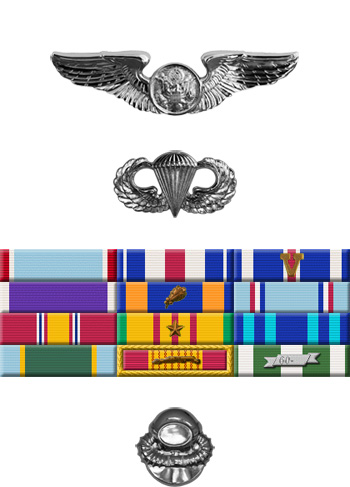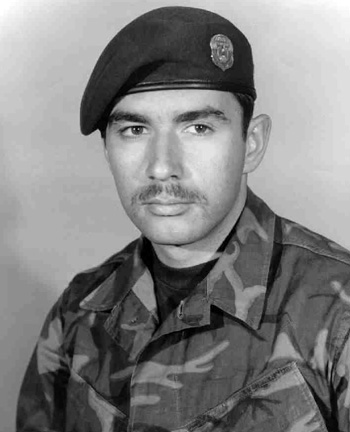Doug King was born on March 29, 1946, in Muscatine, Iowa. He enlisted in the U.S. Air Force on January 13, 1967, and was trained as a Pararescueman. After completing Airborne School, Scuba Divers School, Medical Training, Mountain Climbing School, and the Pararescue Technician Course, King was assigned to Detachment 1 of the 40th Aerospace Rescue and Recovery Squadron at Nakhon Phanom Royal Thai AFB, Thailand, in February 1968. On Christmas Day, December 25, 1968, Airman King was dropped into a jungle in Laos to rescue a downed pilot. He was attacked by enemy forces while on the ground and could not be retrieved by the rescue helicopter. King was listed as Missing in Action, being promoted through the ranks to Chief Master Sergeant, until he was presumed Killed in Action on May 5, 1978. His remains have never been recovered.
His Air Force Cross Citation reads:
The President of the United States takes pride in presenting the Air Force Cross (Posthumously) to Charles Douglas King, Airman First Class, U.S. Air Force, for extraordinary heroism in connection with military operations against an opposing armed force as a Pararescueman in an HH-3E Rescue Helicopter of Detachment 1, 40th Aerospace Rescue and Recovery Squadron, 3d Air Rescue and Recovery Group, Nakhon Phanom Royal Thai Air Base, Thailand, SEVENTH Air Force, in action near Ban Lathama, Mahaxia District, Khammouan Province, Laos, on 25 December 1968. On that date, Airman King was aboard a helicopter engaged in the recovery of a downed United States Air Force pilot from an extremely hostile area. With complete disregard for his own safety, Airman King voluntarily descended on a rescue hoist more than one hundred feet to the ground to aid the injured pilot. Once on the ground, he carried the rescue device to the pilot, freed him from the parachute, secured him to the rescue device, and then used the cable hoist to drag the pilot to a point near the hovering helicopter. Suddenly, enemy soldiers closed in and directed automatic weapons fire at Airman King, the injured pilot, and the helicopter. Though wounded, Airman King, in an extraordinary display of courage and valor, placed his comrades lives above his own by refusing to continue their exposure to the murderous enemy fire. Without taking time to secure himself to the hoist cable, he radioed that he was hit and for the helicopter to pull away. Airman King made this selfless decision with the full realization that once the helicopter departed, he would be alone, wounded, and surrounded by armed, hostile forces. Through his extraordinary heroism, superb airmanship, and aggressiveness in the face of the enemy, Airman King reflected the highest credit upon himself and the United States Air Force.
|



